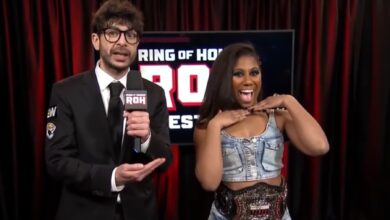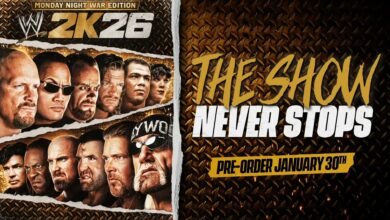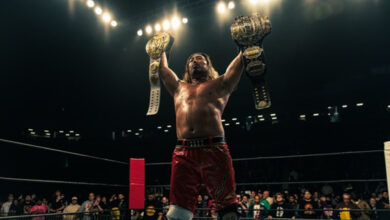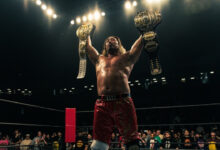Chris Hero Advises Wrestlers To Create ‘A Filter’ For Opinions Without Tuning Out Criticism Entirely
Chris Hero attempts to convey the importance of not shutting out any bit of advice in wrestling but being able to develop a filter that best suits your style.
Chris Hero has been wrestling for 20 years. In that time, he has crossed paths with many different minds in the industry from Johnny Saint, to Triple H, to Paul Heyman, Hero has had the benefit of being a journeyman in the industry and building a body of work around his own personal experiences and knowledge that has been passed down to him.
During a Q&A session on his AdFreeShows podcast, “Can Chris Hero Save Wrestling?”, Hero was asked if he found it difficult to be mentored during his tenure at the WWE Performance Center by individuals such as Joey Mercury and Norman Smiley because of their lack of relative success on a mainstream level in wrestling.
Chris would begin his very detailed response by explaining why this particular question singled out two of the worst possible candidates available when attempting to provide an example of a coach who cannot provide an extensive wealth of knowledge.
“You could not have picked two worse names because Mercury is a guy I first started working with [while] in Ring of Honor in like 2010. He came in for a little while and he just kind of brought a different approach, a different mentality. He was not a bitter, grizzled old vet at that time and could take what we were doing and put it through a different lens, you know? Applying things that he had learned from working with Eddie Guerrero and such and he really became a great mind for pro wrestling. He’s a guy that broke in [into wrestling] in his teens. [At the age of] 15-16, he was having matches and he was a part of that whole Omega crew if you’re familiar with that. That’s [Matt and Jeff Hardy], Shane Helms, Shannon Moore… Those Omega shows were really cool things to get on tape at that time and see the stuff that the TLC Match Hardy Boys had been doing in the five years prior to. Mercury was in the mix with that, he and his partner, Christian York, and then they’d also just traveled up and down the east coast independents and worked a lot with just every tag team you can imagine back then. So, he’s a guy that brought a great wealth of knowledge at that time.”
Chris would then turn his attention to putting over Norman Smiley and everything he brings to any environment where he is training.
“I cannot put over Norman Smiley enough. His career trajectory is unlike anybody’s that I can think of in the history of pro wrestling. He is a guy that was into bodybuilding, so he started training and did jobs in the [Championship Wrestling from Florida] era. He took that and ended up going over to Japan to have worked shoot fights. Here is a guy that got squashed by The Big Steel Man or something and now he’s on a plane to Japan and he’s in the ring with Masakatsu Funaki. Then, he takes that and comes back to the States, this is also the guy that grew up watching World of Sport as a child in England, so he always had that interest in his head, he came back to the States. He ends up Pat O’Connor Memorial Cup, teaming with Chris Adams wrestling Konnan and Rey Mysterio Sr. That earns him a spot working full-time in Mexico for years, and then that earns him a spot in WCW where he, of all things, gets over as an outlandish comedy character. Then, he parlays that into becoming you know part of the first team of coaches in that Florida Championship Wrestling and has been training developmental talent since.
“What an array of talent and just all these experiences that he can convey to people and just, through it all, just such a genuinely nice guy. It is easy to have a good rapport with. He’s got a good sense of humor, and he feels fortunate to have his job and to have done what he has done in wrestling. He is one of the most valuable people I have ever spent time working with and learning from, you know? He’s a great guy on top of it all. Even if he was an asshole, he would still have tons of knowledge to hand over.”
Then moving on to the actual meat of the question, Chris hero explained the importance of developing a filter for the multiple opinions you will undoubtedly intake every time you step between the ropes.
“I have spent time being told what to do by people whose opinion and wrestling I did not particularly care for. I have also had people that I thought the world of, give me advice that turned out to not be good advice in wrestling. So there is no exact blueprint on who to listen to, when to listen to them, and why. You just have to go on your own personal experience and I think you should never shut yourself off from any type of critique because you can always do better, you can always be smarter, you can always learn more, and sometimes that comes from the most unlikely source. I remember when Perry Saturn would come to Tampa and then later the Performance Center as a guest coach. Anybody that knows Saturn or is familiar with his career, you have a certain image of him or opinion of him and I just remember hearing Perry say a couple of things and being like, ‘Wow, that was really smart. I did not expect that.’ and these little nuggets of info can come from the most unlikely source. So, in these situations, you should never turn yourself off from criticism. You should just sit back and develop what I like to call a filter because when you have a match, there are a half-dozen opinions out there.
“You have the opinion of the booker/promoter, you have the opinion of your producer of the match if there is one. You have the opinion of the boys in the back, you have the opinion of whoever broke you into wrestling if you have a mentor-mentee relationship with them. You have the opinion of the live audience, and then you also have the opinion of the not live audience, the people that either watch this on streaming, or they watched it on YouTube, or however they managed to see this match, they’re also going to have an opinion. Holy shit, that is, just off the top of my head, that’s just seven opinions. That doesn’t even take into account your peers, whom you have developed relationships with that look out for you and give you advice.”
He continued, “It’s impossible and overwhelming to factor in all these opinions at once you will lose your shit, you will go crazy, you will stop enjoying the thing that you love if you try to do all that. it’s not possible so you have to create a filter. To you, it can be whose opinion is the most valuable to you, right? Well, it’s probably the boss, probably the head guy in charge, because you want to have you want to make him happy and you want him to continue to have faith in you and to give you more opportunities so you need to value that person’s opinion. Then, also it’s very important to be on the same page with whoever you’re having the match with. You want to develop a relationship with that person, so they enjoy having matches with you. Man, I’ve had some experiences over the years where it’s like, ‘Are we working together or we working against each other?’ The match is over and the next thing you know, you don’t see your opponent again for the rest of the night. He didn’t ask how you were, it’s just– I don’t know man, that’s not how teammates treat each other and work with each other. So, it is important to have the trust and respect of the person you’re sharing the ring with and there are just certain people whose opinions you should put on a higher pedestal than others, right? So you don’t know who’s who until you start getting some experience and you start making mental notes of these.
“You also have to value your own opinion. Once you put in some years, once you’ve had a little bit of success, you can take a step back and give yourself a little credit. Man, you know, if everybody hated the match, everybody thinks it sucked, are you at least happy with it? Did you at least have fun and enjoy yourself and feel proud for going to bat for the thing that you believed in? At the end of the day, it’s not all that serious. It’s batting average. You’re going to strike out, you’re going to pop a fly, sometimes you’re going to hit a grand slam. it’s an analogy and it works. You just want to have a high batting average, you just want to knock it out the park more often than not, and you never know whose opinion is going to help push you to that next level. It is chemistry, man. It is putting this element and this element, and then this one, [and] at the end it’s a completely different product. It is fun to figure that out. There’s no blueprint to it.”
To conclude, Chris Hero would say it can be easy to get wrapped up and be bitter or spiteful, but if there’s any chance that someone can pass along any negative knowledge to help you improve your overall product, it is beneficial in the end.
Chris Hero has not wrestled since being released by WWE in April 2020 but he has noted that he is looking to get back into the ring once he feels comfortable doing so again.
Access to this podcast is available through an AdFreeShows subscription. You can subscribe here. If you use any of the above quotes, please credit Fightful for the transcription and look back to this article.




